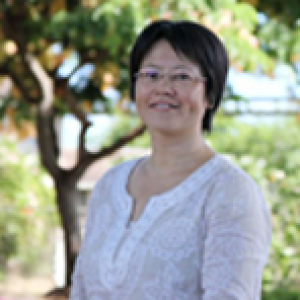Baoyan Cheng
Associate Professor in Comparative/International Education

"In an increasingly globalized world where people of different backgrounds are brought closer and cultural encounters occur anywhere and at any time, multicultural education is needed more than ever."
Hometown
Shaanxi Province
Department
Educational Foundations
Related Degrees
- MEd, Educational Foundations: Educational Leadership
Where are you from?
I come from a small town in Shaanxi Province, which is located in the Northwestern part of China. Economically, it is an underdeveloped region, but culturally very rich. The capital city of Xi’an of the province, near my hometown, was the capital city of thirteen dynasties in ancient China.
What degrees do you hold?
I have an MA in English language and literature from Wuhan University, an MA in international education policy from the University of Maryland, College Park, and an EdD in international education from the Harvard Graduate School of Education.
How long have you been with the COE?
I have been here six years.
What do you teach?
I teach comparative and international education courses to graduate students in the EdLeads* program as well as in our regular master and doctoral programs. In research, my current focus is China, and I am hoping to extend it to other Asia Pacific regions in the future. I try to cover all regions students are interested in.
How did you become interested in educational foundations?
Unlike other departments in the COE, which focus on teaching specific skills to students, the Department of Educational Foundations focuses on helping students explore fundamental questions and broad issues in education on both national and international levels from multiple perspectives – philosophical, historical, socio-cultural, and political. It holds high the value of equity and social justice. My professional background and interest has fit in well with the mission and philosophy of the department. Believing that education is a crucial avenue to social mobility, I have studied the issue of access to college with a special focus on financial aid policies in China. In addition to equity issues in education, I am also studying the issue of quality from the perspective of globalization and internationalization.
Why is multicultural education so important?
Multicultural education helps to cultivate in individuals such qualities as open-mindedness, empathy/compassion, respect for diversity and difference, concern for and understanding of others. It helps one to relate to others, especially those with a different background, and to understand the common predicament and vulnerability of humanity. A society full of citizens with those qualities would make it a more just and equitable place to live. In an increasingly globalized world where people of different backgrounds are brought closer and cultural encounters occur anywhere and at any time, multicultural education is needed more than ever.
What is your philosophy of teaching?
In teaching, I pay equal attention to both laying a solid knowledge foundation for students and helping them to develop their ability to think and reason in a dialectical and critical manner. My ultimate goal is to facilitate students’ all-rounded development so that they can become caring and capable educators who are well-equipped to teach and research, and can act as responsible and compassionate individuals who are deeply concerned with social issues such as equity and social justice.
Tell us about your recent meeting in Taiwan.
This past July, I represented UH Mānoa at a leadership institute, titled “Research and Innovation in Asia Pacific Higher Education and 21st Century Learning Skills,” which was held at the National Chung Cheng University in Taiwan. This institute provided a platform for researchers and administrators, senior and junior, from China, Indonesia, Japan, Malaysia, Thailand, Vietnam, and the United States to share their understandings of education from diverse perspectives. Through this, I was able to further my professional relationships with researchers and scholars working in higher education in the Asia Pacific region, and I was very much inspired by the stimulating discussions on important issues in higher education in the age of globalization.
What are your future plans?
I am committed to constantly improving myself as a responsible and compassionate teacher, researcher, and community member. In teaching, my ultimate goal is to educate students to become competent teachers and good citizens; through research, I aim to fulfill my professional responsibility of improving educational equality/quality and promoting cultural understanding; and in public service, I hope to extend my responsibility and compassion to the community I live in.
*EdLeads is a 30-credit graduate studies program, leading to an MEd in Educational Foundations. It is designed to enable educators to pursue a master’s degree without career interruption. With an emphasis on the exploration of educational issues from cultural, philosophical, historical, and international perspectives, the entire program may be completed in less than fifteen months (2 summer terms, 5 weeks each) through a combination of online work and on-campus classes.
